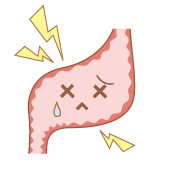Stomach, stomach acid, and lactic acid bacteria
Little-known function of lactic acid bacteria for protecting the stomach
The third Sunday in June is Father’s Day, and we hope your father is well.
If your father has any stomach problems, some bad bacteria might be bothering him, as these are known to cause gastritis and ulcers.
As there are some rumors concerning lactic acid bacteria and their effect of mitigating bad bacteria, we asked the following questions to Dr. Yasuhiro Koga, who is professor at Tokai University’s School of Medicine, and President of the Japanese Society for Probiotics Science.
Do bad bacteria exist in the stomach also?
It’s a well-known fact that a lot of bad bacteria live inside the intestines. It was discovered in 1983 that these bacteria in our stomach cause gastritis, ulcers and other diseases. One notable species of such bacteria is helically-shaped Helicobacter pylori. This bacterium usually moves around in the gastric mucus and sucks on the interior wall of the stomach for nutrition, causing inflammation in the process. If this inflammation occurs repeatedly, the stomach becomes exhausted like a worn-out rag and develops ulcers, etc. Even if the symptoms are pharmaceutically treated and cured, 60 to 70% of patients have relapses within two years, unless H. pylori is completely eradicated. |
 |
 |
Is it possible to get rid of H. pylori with antibiotics?
Studies suggest that as many as 35 million people are infected with H. pylori in Japan. Perhaps your father is in this group. While antibiotics are proven to effectively eradicate the bacterium, patients suffering from stomach ulcers are usually given two types of antibiotics to kill off H. pylori, along with another drug for suppressing the secretion of gastric acid. Our universal health insurance used to exclude all H. pylori treatments from coverage except for a small number of certain diseases such as stomach ulcers and duodenal ulcers. However, as the efficacy and safety of the medications used to treat the disease were verified, stomach ulcers were included under the universal health coverage starting February 21, 2013.
|
 |
 |
Do lactic acid bacteria also help exterminate H. pylori?
After much trial and error, a strain of lactic acid bacteria called “OLL2716” was discovered that was proven to be effective for the purpose. The research found that H. pylori is susceptible to the lactate that is produced by this lactic acid bacterium. There are four main reasons why the OLL2716 lactic acid bacterium is considered effective in treating H. pylori infections.
- (1)Resistance to stomach acid.
OLL2716 lactic acid bacteria are able to survive in an environment that is highly acidic.
- (2)Ability to thrive in the stomach
Although nutrition is scarce in the stomach compared to the intestines, OLL2716 lactic acid bacteria can live in the stomach normally.
- (3) Production of lactate that helps eradiate H. pylori
OLL2716 lactic acid bacteria produce lactate that is known to weaken H. pylori.
- (4)Ability to settle on the epithelium of the stomach, where H. pylori exist
OLL2716 lactic acid bacteria can attach to and live on the surface tissue where there is a large population of H. pylori.
What are the functions of OLL2716 lactic acid bacteria?
The bacterium, when ingested regularly, securely attaches to the gastric mucus and works like a protective cover of the stomach, keeping it healthy. Research has shown that it not only helps recover from stomach disease but also heals the damage caused to the gastric mucus by antipyretics, analgesics, and even alcohol consumption. So it’s ideal for both fathers who like to drink sake and mothers who are suffering from chronic headaches.




